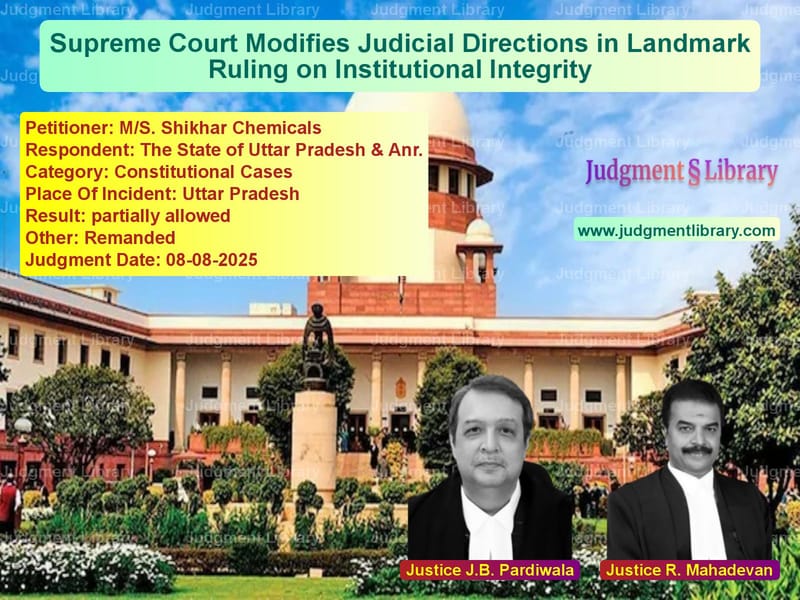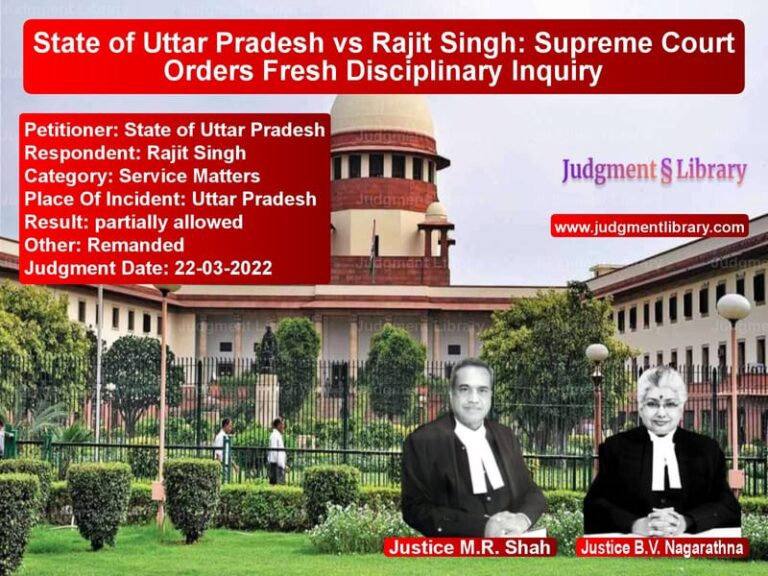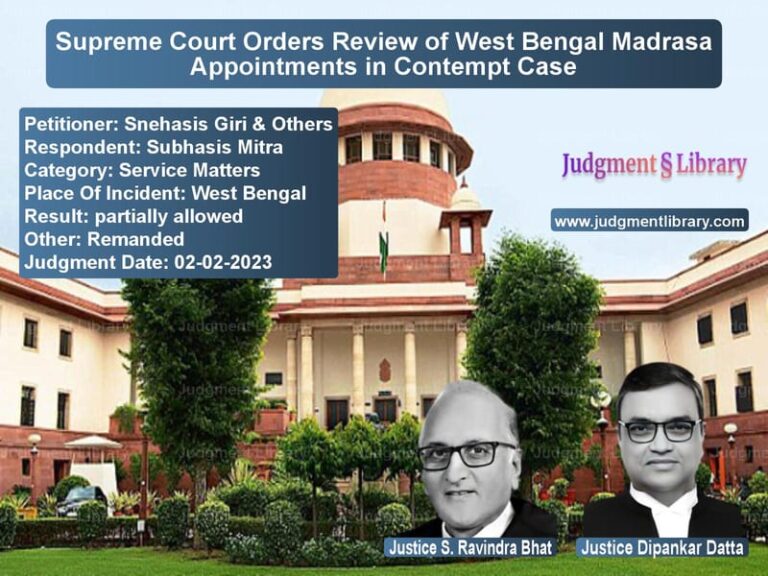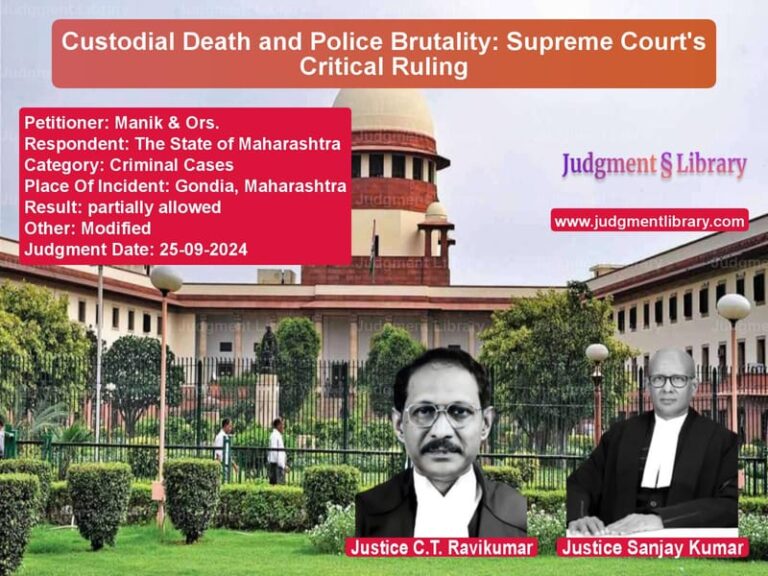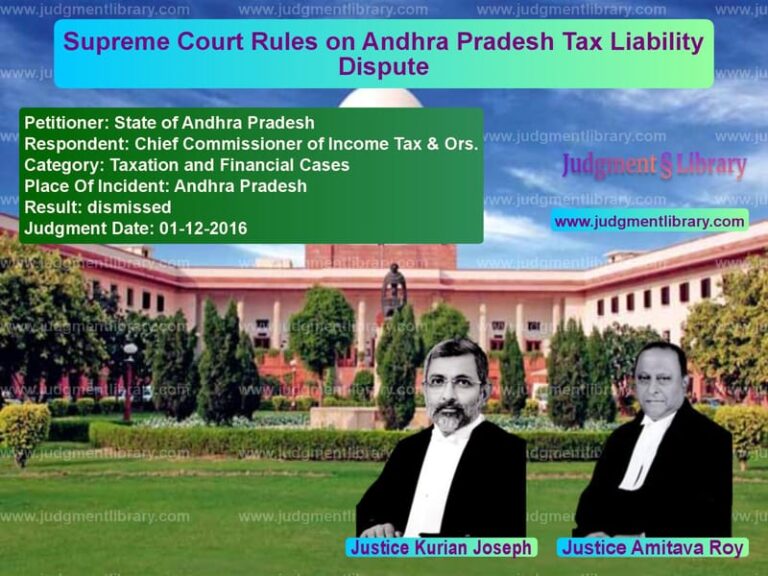Supreme Court Modifies Judicial Directions in Landmark Ruling on Institutional Integrity
In an extraordinary turn of events that highlights the delicate balance of power within India’s judicial system, the Supreme Court recently revisited its own controversial directions concerning a High Court judge while emphasizing the critical importance of maintaining institutional credibility. The case involving M/s Shikhar Chemicals and the State of Uttar Pradesh took an unexpected procedural detour when the Chief Justice of India personally intervened, leading to a rare reconsideration of judicial directives that had sparked significant debate within legal circles.
The matter originated from a Special Leave Petition that had been partly allowed by the Supreme Court on August 4, 2025. In that initial ruling, the Court had set aside an impugned judgment from the Allahabad High Court and remanded the matter back for fresh consideration. However, what made the original order particularly noteworthy were the extraordinary directions contained in paragraphs 25 and 26, which specifically addressed the conduct of the concerned High Court judge who had handled the case.
The Supreme Court’s original order had stated: “The Chief Justice shall make the concerned judge sit in a Division Bench with a seasoned senior judge of the High Court.” Even more significantly, the Court had directed that “the concerned judge shall not be assigned any criminal determination, till he demits office. If at all at some point of time, he is to be made to sit as a single judge, he shall not be assigned any criminal determination.” These directions were unprecedented in their specificity and reflected the Court’s deep concerns about the quality of judicial decision-making.
The rationale behind these strong measures was explained in paragraph 27 of the original order, which the Court reproduced in its subsequent reconsideration: “We have been constrained to issue directions as contained in Paras 22, 23, 24, 25 and 26 respectively, referred to above, keeping in mind that the impugned order is not the only erroneous order of the concerned Judge that we have looked into for the first time. Many such erroneous orders have been looked into by us over a period of time.” This revelation indicated that the Court’s concerns were not based on a single instance but represented a pattern of judicial decision-making that required intervention.
The case took a dramatic turn when the Supreme Court received an undated letter from the Chief Justice of India requesting reconsideration of the directions issued in paragraphs 25 and 26. This intervention led to the matter being re-notified for hearing, demonstrating the respect and deference accorded to the office of the Chief Justice within the judicial hierarchy.
In their reconsideration, the Supreme Court bench comprising Justices J.B. Pardiwala and R. Mahadevan clarified that their original intention was never to cause embarrassment or cast aspersions on the concerned judge. They emphasized that “when matters cross the threshold and the dignity of the institution is imperiled, it becomes the constitutional responsibility of this Court to intervene, even when acting under its appellate jurisdiction under Article 136 of the Constitution.” This statement underscores the Supreme Court’s view of its role as the ultimate guardian of judicial standards in the country.
The Court explained that its concerns went beyond mere errors in legal interpretation or factual appreciation. The justices noted that “The litigants in this country approach different courts of law to seek justice. For 90% of the litigants in this country, the High Court is the final court of justice. Only the remaining 10% can afford to approach the Supreme Court. The litigants who come to court expect the justice delivery system to function in accordance with law, not to obtain absurd or irrational orders.” This observation highlights the practical reality that for most Indian citizens, High Courts represent the final avenue for justice, making their proper functioning crucial to maintaining public trust in the judicial system.
Despite their clear concerns about judicial standards, the Supreme Court demonstrated institutional deference by acceding to the Chief Justice’s request. The Court stated, “In any view of the matter, since a request has been made in writing by Hon’ble the Chief Justice of India, and in due deference to the same, we hereby delete paras 25 and 26 respectively from our order dated 4th August, 2025.” This decision reflects the delicate balance the Court must maintain between addressing systemic issues and respecting the administrative autonomy of other judicial institutions.
However, the Court made it clear that while it was withdrawing the specific directives, it was not abandoning its concerns. The justices noted, “While we are deleting paras 25 and 26 respectively from our order dated 04th August, 2025, we leave it to the Chief Justice of the Allahabad High Court to look into the matter.” They further acknowledged that “the Chief Justice of a High Court is the master of the roster” but qualified this by stating that “when matters raise institutional concerns affecting the rule of law, this Court may be compelled to step in and take corrective steps.”
The Supreme Court reinforced its position by referencing a recent observation from another bench comprising former Chief Justice Sanjiv Khanna and Justice Sanjay Kumar in the Rikhab Birani case: “We are also constrained to impose costs of Rs. 50,000/- (Rupees Fifty Thousand Only) on the State of Uttar Pradesh as in spite of repeated judgments/orders of this Court, we are being flooded with cases of civil wrongs being made the subject matter of criminal proceedings by filing chargesheets, etc.” This reference indicates that the Court’s concerns about the proper administration of justice extend beyond individual cases to broader systemic issues.
In their concluding remarks, the Supreme Court expressed hope “that in future, we may not have to come across such perverse and unjust orders from any High Court.” They emphasized that “The endeavour of the High Courts should always be to uphold the rule of law and maintain institutional credibility.” The Court delivered a powerful warning about the consequences of failing to maintain judicial standards: “If the Rule of Law is not maintained or protected within the court itself, then that would be the end of the entire justice delivery system in the country.”
The judgment concludes with a clear expectation for all judicial officers: “Judges at any level are expected to work efficiently, discharge their duties diligently and always strive hard to fulfill their constitutional oath.” This statement serves as both a reminder of the solemn responsibilities borne by judges and a benchmark against which their performance should be measured.
This case represents a significant moment in Indian judicial history, demonstrating the Supreme Court’s willingness to address concerns about judicial performance while simultaneously showing deference to institutional hierarchies. The Court’s decision to modify its own directives while maintaining its substantive concerns illustrates the complex balancing act required to maintain both judicial standards and institutional harmony. The episode serves as a reminder that the health of India’s justice delivery system depends not only on the correct application of law in individual cases but also on the broader ecosystem of judicial accountability and institutional integrity.
Petitioner Name: M/S. Shikhar Chemicals.Respondent Name: The State of Uttar Pradesh & Anr..Judgment By: Justice J.B. Pardiwala, Justice R. Mahadevan.Place Of Incident: Uttar Pradesh.Judgment Date: 08-08-2025.Result: partially allowed.
Don’t miss out on the full details! Download the complete judgment in PDF format below and gain valuable insights instantly!
Download Judgment: ms.-shikhar-chemica-vs-the-state-of-uttar-p-supreme-court-of-india-judgment-dated-08-08-2025.pdf
Directly Download Judgment: Directly download this Judgment
See all petitions in Constitution Interpretation
See all petitions in Separation of Powers
See all petitions in Legal Malpractice
See all petitions in Contempt Of Court cases
See all petitions in Judgment by J.B. Pardiwala
See all petitions in Judgment by R. Mahadevan
See all petitions in partially allowed
See all petitions in Remanded
See all petitions in supreme court of India judgments August 2025
See all petitions in 2025 judgments
See all posts in Constitutional Cases Category
See all allowed petitions in Constitutional Cases Category
See all Dismissed petitions in Constitutional Cases Category
See all partially allowed petitions in Constitutional Cases Category

